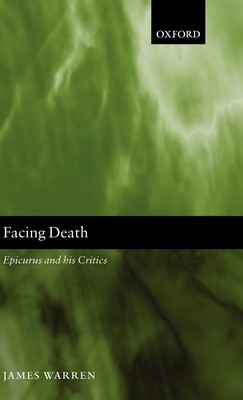
- We will send in 10–14 business days.
- Author: James Warren
- Publisher: Clarendon Press
- ISBN-10: 0199252890
- ISBN-13: 9780199252893
- Format: 16.4 x 22.2 x 1.9 cm, hardcover
- Language: English
- SAVE -10% with code: EXTRA
Reviews
Description
The ancient philosophical school of Epicureanism tried to argue that death is "nothing to us." Were they right? James Warren provides a comprehensive study and articulation of the interlocking arguments against the fear of death found not only in the writings of Epicurus himself, but also in Lucretius' poem De rerum natura and in Philodemus' work De morte. These arguments are central to the Epicurean project of providing ataraxia (freedom from anxiety) and therefore central to an understanding of Epicureanism as a whole. They also offer significant resources for modern discussions of the value of death--one which stands at the intersection of metaphysics and ethics. If death is the end of the subject, and the subject can not be benefited nor harmed after death, is it reasonable nevertheless to fear the ceasing-to-be? If the Epicureans are not right to claim that the dead can neither be benefited nor harmed, what alternative models might be offered for understanding the harm done
by death and do these alternatives suffer from any further difficulties? The discussion involves consideration of both ethical and metaphysical topics since it requires analysis not only of the nature of a good life but also the nature of personal identity and time. A number of modern philosophers have offered criticisms or defences of the Epicureans' views. Warren explores and evaluates these in the light of a systematic and detailed study of the precise form and intention of the Epicureans' original arguments.
EXTRA 10 % discount with code: EXTRA
The promotion ends in 18d.17:45:48
The discount code is valid when purchasing from 10 €. Discounts do not stack.
- Author: James Warren
- Publisher: Clarendon Press
- ISBN-10: 0199252890
- ISBN-13: 9780199252893
- Format: 16.4 x 22.2 x 1.9 cm, hardcover
- Language: English English
The ancient philosophical school of Epicureanism tried to argue that death is "nothing to us." Were they right? James Warren provides a comprehensive study and articulation of the interlocking arguments against the fear of death found not only in the writings of Epicurus himself, but also in Lucretius' poem De rerum natura and in Philodemus' work De morte. These arguments are central to the Epicurean project of providing ataraxia (freedom from anxiety) and therefore central to an understanding of Epicureanism as a whole. They also offer significant resources for modern discussions of the value of death--one which stands at the intersection of metaphysics and ethics. If death is the end of the subject, and the subject can not be benefited nor harmed after death, is it reasonable nevertheless to fear the ceasing-to-be? If the Epicureans are not right to claim that the dead can neither be benefited nor harmed, what alternative models might be offered for understanding the harm done
by death and do these alternatives suffer from any further difficulties? The discussion involves consideration of both ethical and metaphysical topics since it requires analysis not only of the nature of a good life but also the nature of personal identity and time. A number of modern philosophers have offered criticisms or defences of the Epicureans' views. Warren explores and evaluates these in the light of a systematic and detailed study of the precise form and intention of the Epicureans' original arguments.


Reviews